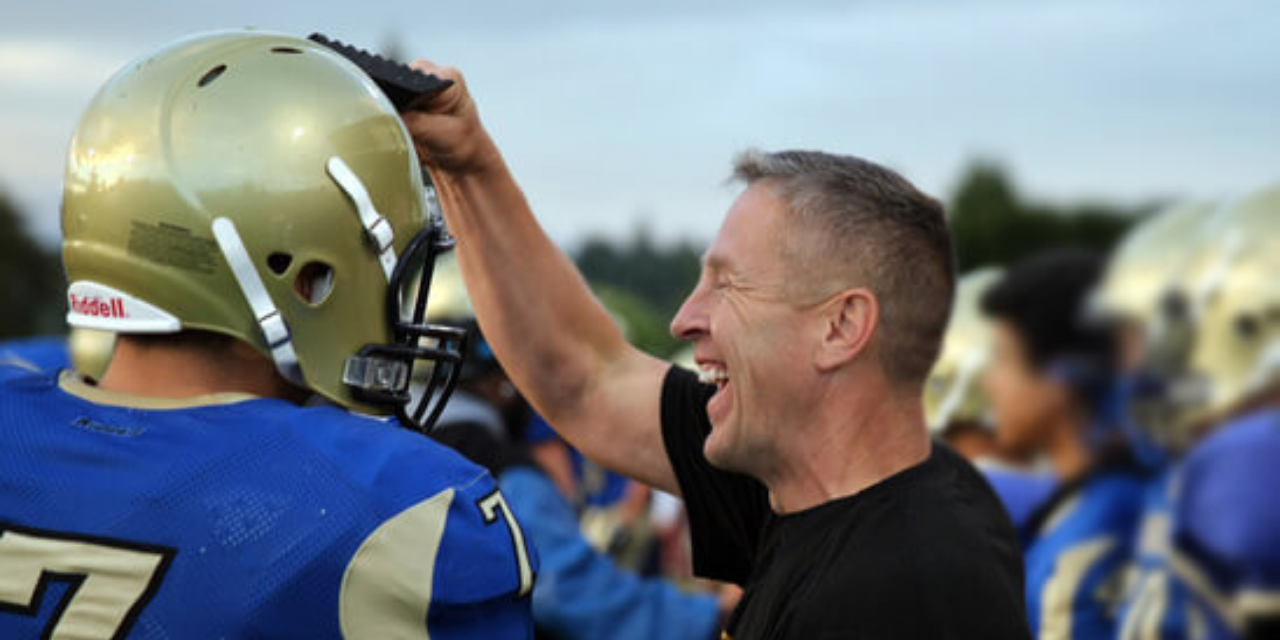It cannot be that the First Amendment forbids teachers from modeling good behavior – like quietly praying – on the 50-yard line after a high school football game. That’s what Coach Joe Kennedy and his attorneys will be arguing to the U.S. Supreme Court if the justices grant the petition filed this week on his behalf with the nation’s high court.
This is the second time Coach Kennedy has asked the Supreme Court to hear his case. His legal journey began in the fall of 2015, when Kennedy was in his seventh year as an assistant high school football coach at Bremerton High School in Oregon. A devout Christian, Kennedy typically knelt down at mid-field at the conclusion of the school’s weekly football game and quietly gave thanks – in a 15- to 30-second prayer – for what the players had accomplished and for the opportunity to be part of their lives through football.
All was well until an observer’s complaint about Kennedy’s role-modeling to one of the school’s administrators landed him in hot water after a game that September. Kennedy was instructed to change his ways so that no one could see him praying, even silently. After several rounds of correspondence about school policy, Kennedy felt he could not in good conscience give up his right to pray, and the school’s relationship with him soured to the extent that it chose not to renew his contract, effectively firing him.
Kennedy’s first trip through the legal system took him to the Supreme Court after the lower courts, including the 9th U.S. Circuit Court of Appeals, refused to grant him an injunction that would have given him his job back. In 2019, the Supreme Court turned down his case for a hearing – in legal terminology this is called “denying cert” – but in an unusual twist, four of the justices wrote a statement saying that he should bring the case back to them in the future.
Those justices – Samuel Alito, Clarence Thomas, Brett Kavanaugh and Neil Gorsuch – pointed out that they agreed the case was not ripe for them to review because “important unresolved factual questions would make it very difficult if not impossible at this stage to decide the free speech question that the petition asks us to review.” So Coach Kennedy started over.
The lower courts heard further evidence and once again ruled against Kennedy, including a three-judge panel at the 9th Circuit. However, a sizable minority of active 9th Circuit judges voted, albeit unsuccessfully, to re-hear the case in front of a larger panel of judges. That action signaled a significant concern that the three-judge panel had decided the constitutional issues incorrectly.
Now, hopefully, the factual evidence in Kennedy’s case has been clarified enough that the Supreme Court will agree to take his case and listen to his arguments.
Kennedy is represented by First Liberty Institute, which explained in a press release why this appeal is so important.
“No American should be forced to choose between their faith and the job they love,” said Kelly Shackelford, President, CEO, and Chief Counsel at First Liberty. “The Ninth Circuit’s opinion threatens the rights of millions of Americans who simply want to be able to freely exercise their faith without fear of losing their job. We hope the Supreme Court will right this wrong and restore Coach Kennedy to the football field where he belongs.”
This isn’t a case about a teacher or coach coercing students to pray. That wouldn’t be right. This case is about whether a public school is required, under the Constitution, to prevent anyone from seeing that teacher or coach pray a private prayer.
It would be a shame if men like Coach Kennedy are prohibited from modeling good behavior in front of their players and students. As Focus on the Family President Jim Daly wrote in a 2017 op-ed for Fox News about this case, the courts reviewing Kennedy’s case have come to conclusions that the average person doesn’t understand or agree with.
“Let’s be reasonable,” Daly wrote. “We cannot simply ignore the assertion in our Declaration of Independence that God has given us inalienable rights like the freedoms of speech and religion – and that it is the duty of government to ‘secure’ those rights.
“As former teenage boy who was once helped by a man in the mold of Kennedy, I know how important men like him are. Now that I’m a dad, I would love for my two sons to have coaches and teachers like him – people who live out the principles of honor, hard work, conviction and compassion. These are things we can all agree are right and good.”
Let’s pray that the Supreme Court will see things the same way.
The case is Kennedy v. Bremerton School District.
Related:
Coach Kennedy Will Appeal 9th Circuit Decision Denying His Right to Pray After Football Games
Standing Up for Our Religious Freedoms – Broadcast
Photo from First Liberty Institute.






